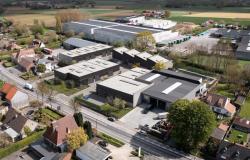April 3, 2024
Today at
15:27
From Wednesday, the first test drillings will be carried out in Voeren to demonstrate whether the subsurface at the three-country point is suitable for building the Einstein Telescope.
Over the next six months, test drilling will take place at eleven locations in Voeren, the province of Liège and Dutch Limburg, drilling to a depth of approximately 300 meters. These should provide more information about the suitability of the soil.
“The results of this drilling campaign are important to gain insight into the composition and stability of the soil,” says director Hans Plets of the Einstein Telescope project agency. ‘These are essential indicators for determining the best locations for the three corner points of the Einstein Telescope.’
If the Einstein Telescope comes to the Eurregio Meuse-Rhine, it will create many jobs.
The Einstein Telescope will be an underground measuring system that detects gravitational waves with extreme sensitivity. This makes it possible to measure things in the furthest corners of our universe. The telescope will form a triangle, with sides of 10 kilometers long, at a depth of 250 meters. The underground observatory will be ten times more sensitive than its predecessors and can detect a thousand times more gravitational waves. That should provide a completely new view of our universe.
In addition to the border triangle of Belgium, the Netherlands and Germany, the Italian island of Sardinia is also one of the candidates for the construction of the telescope.
If the Einstein Telescope comes to the Meuse-Rhine Eurregio, it will create many jobs, create an incentive effect for STEM training and an innovative knowledge economy will develop in the region, it is hoped.
Flemish Minister of Innovation Jo Brouns (CD&V) also announced at the start of the test drilling that he is providing 5.5 million euros in additional resources to prepare the submission file for the Einstein Telescope at the European level. The money is also intended for a detailed study into the exact costs and financing options of construction. Previous studies showed that every euro invested would yield an added value of 3 to 4 euros for the wider region.
A decision on where the telescope will ultimately be built is expected in 2026.
Full screen display
Tags: Limburg suitable Einstein Telescope Start test drilling





